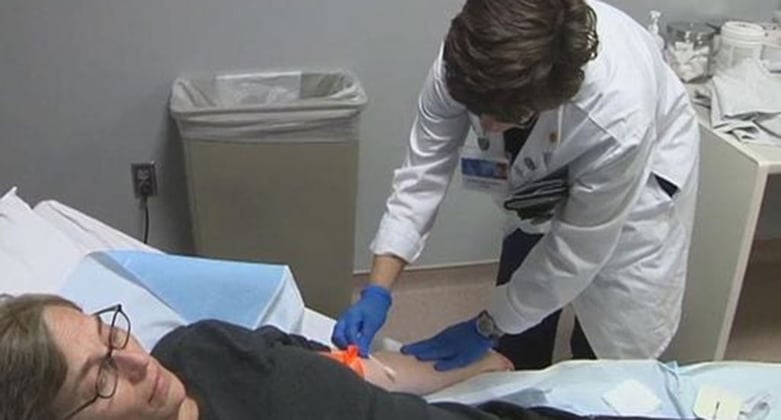Editor's note: The following article is about a cancer treatment using the measles virus as virotherapy. The treatment and this article in no way suggest that patients should avoid getting vaccinated for the measles. The MMR (measles, mumps and rubella) vaccine is safe and has been clinically proven to prevent patients from developing measles, a disease that can be deadly for both children and adults. The MMR vaccine also helps immunize patients against mumps (which can cause sterility in men and also lead to deafness and meningitis) and rubella (a dangerous disease for pregnant women as it can lead to miscarriage, stillbirth and severe birth defects in the fetus).
High doses of the measles virus have put two patients’ blood cancer into remission, researchers at the Mayo Clinic reported this week, offering hope to many that a single-dose treatment could save the lives of many cancer patients.
The study, published in the journal Mayo Clinic Proceedings, says the measles virus “infects and kills cancer cells but spares normal tissues — [and] can be effective against the deadly cancer multiple myeloma.”
The two patients in the study received a “single intravenous dose of an engineered measles virus (MV-NIS) that is selectively toxic to myeloma plasma cells.” Fortunately, both patients responded, “showing reduction of both bone marrow cancer and myeloma protein,” says the Mayo Clinic News Network in a post by Bob Nellis.
Stacy Erholtz, a 49-year-old woman, experienced complete remission of myeloma (a blood cancer) and has been clear of the disease for over six months. She had previously endured every type of chemotherapy and two stem cell transplants, to no avail.
“This is the first study to establish the feasibility of systemic oncolytic virotherapy for disseminated cancer,” says Stephen Russell, M.D., Ph.D, a Mayo Clinic hematologist and the first author of the paper and co-developer of the therapy.
“These patients were not responsive to other therapies and had experienced several recurrences of their disease.”
The second patient, whose cancer did not respond as well to the treatment, “was equally remarkable because her imaging studies provided a clear proof that the intravenously administered virus specifically targeted the sites of tumor growth. This was done using high-tech imaging studies, which were possible only because the virus had been engineered with a 'snitch gene' — an easily identifiable marker — so researchers could accurately determine its location in the body,” the Mayo Clinic News Network says.
Following are highlights of the study from Mayo Clinic News Network:
- “Multiple myeloma is a cancer of plasma cells in the bone marrow, which also causes skeletal or soft tissue tumors. This cancer usually responds to immune system-stimulating drugs, but eventually overcomes them and is rarely cured.”
- “In their article, the researchers explain they were reporting on these two patients because they were the first two studied at the highest possible dose, had limited previous exposure to measles, and therefore fewer antibodies to the virus, and essentially had no remaining treatment options.”
- “Oncolytic virotherapy – using re-engineered viruses to fight cancer – has a history dating back to the 1950s. Thousands of cancer patients have been treated with oncolytic viruses from many different virus families (herpesviruses, poxviruses, common cold viruses, etc.). However, this study provides the first well-documented case of a patient with disseminated cancer having a complete remission at all disease sites after virus administration.”
- “More of the MV-NIS therapy is being manufactured for a larger, phase 2 clinical trial. The researchers also want to test the effectiveness of the virotherapy in combination with radioactive therapy (iodine-131) in a future study.”
For more information, visit http://newsnetwork.mayoclinic.org/discussion/mayo-clinic-first-to-show-virotherapy-is-promising-against-multiple-myeloma
(Top photo) NEW HOPE FOR BLOOD CANCER: Mayo Clinic study says virotherapy can help fight the deadly cancer multiple myeloma. Photo: Courtesy of KARE/Mayo Clinic
YouTube Video on Mayo Clinic Study

Scott is Director of Digital Content & Alumni Communications Liaison at UMHS and editor of the UMHS Endeavour blog. When he's not writing about UMHS students, faculty, events, public health, alumni and UMHS research, he writes and edits Broadway theater reviews for a website he publishes in New York City, StageZine.com.
















